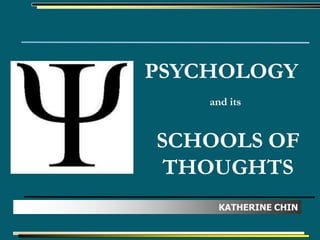
School of thoughts
- 1. PSYCHOLOGY and its SCHOOLS OF THOUGHTS KATHERINE CHIN
- 2. The science that deals with mental processes and behavior. The science of human and animal behavior.
- 4. Biopsychology Clinical Psychology Developmental Psychology Forensic Psychology Industrial & Organizational Psychology Personality Psychology Social Psychology Consumer Psychology
- 5. Rationalism Empiricism Structuralism Functionalism Associationism Behaviorism Gestalt Psychology
- 6. Rationalism perceived the human mind as an active entity that contained innate abilities to understand abstract concepts without having had the 'experience' of those concepts a theory that reason is in itself a source of knowledge superior to and independent of sense perceptions
- 7. reliance on reason as the basis for establishment of religious truth the doctrine that knowledge about reality can be obtained by reason alone without recourse to experience the doctrine that human knowledge can all be encompassed within a single, usually deductive, system the school of philosophy initiated by René Descartes, the French philosopher and mathematician (1596- 1650), which held both the above doctrines
- 8. Empiricism a theory of knowledge that asserts that knowledge comes only or primarily from sensory experience emphasizes the role of experience and evidence, especially sensory perception, in the formation of ideas, over the notion of innate ideas or traditions Empiricism in the philosophy of science emphasizes evidence, especially as discovered in experiments It is a fundamental part of the scientific method that all hypotheses and theories must be tested against observations of the natural world rather than resting solely on a priori reasoning, intuition, or revelation
- 9. Structuralism “science of immediate experience” complex perceptions can be raised through basic sensory information Introspection literally means 'looking within', to try to describe a person's memory, perceptions, cognitive processes, and/or motivations a careful set of observations made under controlled conditions by trained observers using a stringently defined descriptive vocabulary
- 10. Functionalism science of the study of mental experience, of consciousness, to be studied by trained introspection the process of introspection relies exclusively on the purposeful and rational self-observation of one's mental state introspection is often compared with perception, reason, memory, and testimony as a source of knowledge
- 11. Associationism the idea that mental processes operate by the association of one state with its successor states "common sense” 1. A sensory impression leaves a mental representation (idea or image) 2. If two stimuli are presented together repeated, they create an association in the mind; 3. The intensity of such a pairing can serve the same function as repetition.
- 12. The law of contiguity. Things or events that occur close to each other in space or time tend to get linked together in the mind. 2. The law of frequency. The more often two things or events are linked, the more powerful will be that association 3. The law of similarity. If two things are similar, the thought of one will tend to trigger the thought of the other. 4. The law of contrast. On the other hand, seeing or recalling something may also trigger the recollection of something completely opposite.
- 13. Behaviorism learning perspective all things that organisms do—including acting, thinking, and feeling—can and should be regarded as behaviors psychological disorders are best treated by altering behavior patterns or modifying the environment behavior can be studied in a methodical and recognizable manner with no consideration of internal mental states
- 14. Classical Conditioning is a form of learning in which one stimulus, the conditioned stimulus or CS, comes to signal the occurrence of a second stimulus, the unconditioned stimulus or US. The US is usually a biologically significant stimulus such as food or pain that elicits a response from the start; this is called the unconditioned response or UR. The CS usually produces no particular response at first, but after conditioning it elicits the conditioned response or CR.
- 15. Operant Conditioning is a form of learning in which an individual's behavior is modified by its consequences; the behavior may change in form, frequency, or strength. Operant conditioning is distinguished from classical conditioning (or respondent conditioning) in that operant conditioning deals with the modification of "voluntary behavior" or operant behavior
- 16. Gestalt Gestalt – "essence or shape of an entity's complete form“ "The whole is greater than the sum of the parts" The operational principle of gestalt psychology is that the brain is holistic, parallel, and analog, with self-organizing tendencies Stipulate that perception is the product of complex interactions among various stimuli Gestalt theory allows for the breakup of elements from the whole situation into what it really is
- 17. Thank you.
